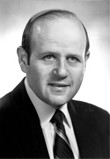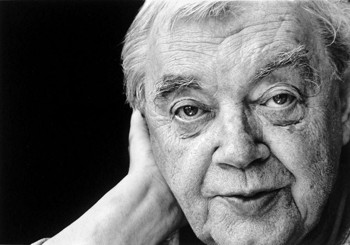FACULTY LEGENDS: A. NEAL GELLER & COLIN ROWE
Anyone who thinks that accounting and financial management are just about numbers on a page didn't have A. Neal Geller '64, MBA '77, as a professor. For Geller, the numbers have to tell a story.

A. Neal Geller, '64, MBA '77. Photo: Provided. See larger image
During his nearly 40 years on the School of Hotel Administration (SHA) faculty, he engaged students and taught them to uncover these narratives and find the meaning hidden in the figures. His stimulating teaching style is the reason he is remembered and beloved by his pupils long after they have graduated.
"He made the numbers dance on paper," says Ted Teng '79, president and CEO of The Leading Hotels of the World Ltd., who established the Ted Teng '79 Dean's Teaching Excellence Awards in honor of Geller and six other faculty members who inspired him as a student. "The tools he gave me have stayed with me my entire career."
Geller grew up in the resort business and earned his bachelor's degree from SHA. He spent eight years as general manager and then head of finance for the Granit Hotel in Kerhonkson, N.Y., and he would draw on these experiences as he peppered his lectures with real-life examples. He began teaching at SHA in 1974 while he was earning an MBA from the Samuel C. Johnson Graduate School of Management, and he joined the faculty full time three years later after receiving a Ph.D. in accounting from Syracuse University.
During his career, Geller authored two books and numerous professional journal articles, was an active industry consultant and served as the school's director of graduate studies and associate dean for academic affairs. But his heart was always in the classroom.
"You have to enjoy students. Some professors are focused on their research and see teaching as a chore," says Geller, a three-time Merrill Presidential Scholar Outstanding Educator. "I love being among young people."
After a decade in administration, Geller returned to teaching in 2000 as the Robert A. Beck Professor of Hospitality Financial Management. He spent the next eight years - ones he describes as the "happiest in my career" - in the classroom, making numbers dance, telling engaging stories and inspiring another generation of Hotelies before retiring in 2008.
– Ashlee McGandy
A historian with interests in philosophy, art and the intrinsic values of buildings, Colin Rowe came to Cornell's College of Architecture, Art and Planning (AAP) in 1962 and influenced a generation of architects and educators over the next 28 years.

Colin Rowe. Photo: Valerie Bennett. See larger image
Rowe's early essays, including "The Mathematics of the Ideal Villa" (1947; featured in the current Cornell Journal of Architecture), "were initial volleys that set up a whole chain reaction - -- of challenges to the dogma of the time," associate professor of architecture Vincent Mulcahy '71 says.
Rowe had "one of the most perceptive eyes to be cast upon a building or a drawing" and "taught students, colleagues and scholars around the world that modern architecture in particular was not revolutionary ... but evolutionary and connected to history," colleagues Jerry Wells and Val Warke, B.Arch. '77, wrote following Rowe's death in 1999.
Rowe created the graduate urban design studio at AAP, and his 1978 book "Collage City," which shifted attention from individual buildings to entire cities, began as a series of Cornell lectures. Many of his students went on to teach architecture at Cornell, Yale, Harvard, Penn, the Rhode Island School of Design and elsewhere. Rowe's influence can also be seen in the formalist designs of his friends Richard Meier '56, B.Arch. '57, and Peter Eisenman '54, B.Arch. '55.
In 1995, the Royal Institute of British Architects gave Rowe its highest honor, the Royal Gold Medal of Architecture, for being "the most significant architectural teacher of the second half of the 20th century."
Rowe, who often talked about Plato or Hegel in class, "would come into an architecture review, and people would expect him to say something profound," Mulcahy recalls. "And he would say something like: 'You know, I think that the relationship of the rise to the run on your stair is not commodious.' And the reaction would be, 'You're kidding, right? You're going to talk about stairs and not big ideas?' And that was kind of an impish, messing-with-you quality that he had."
Rowe retired in 1990 as the Andrew Dickson White Professor of Architecture.
Dean of Students Kent Hubbell '67, B.Arch '69 says that Rowe "impressed his students with his breadth of intellect. Our view of the urban world is still very much influenced by Colin's views."
– Dan Aloi
